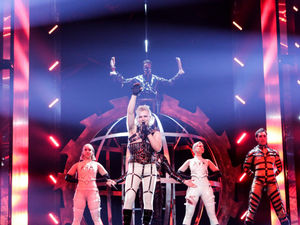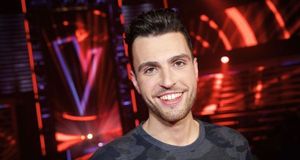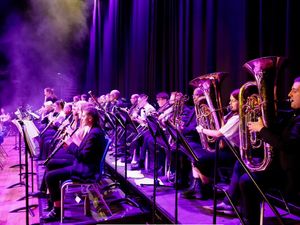Hits, misses and maybes of Eurovision
When the Eurovision Song Contest was launched in 1951, the aim was to bring together the nations of war-torn Europe in a celebration of music and television.

It is probably fair to say that this vision did not extend to a group of Icelandic bondage fans singing about the triumph of hate and the downfall of Europe while wearing gimp masks. Then again, it is supposed to be a celebration of diversity.
But while the jury might be out about Eurovision’s role in bringing peace and harmony to the world, it has created a sort of unity by becoming the music contest everybody loves to hate.
So what can we expect to see from tomorrow’s final? While the results of last night’s semi final were still coming in as we went to press, we think we have a pretty good idea of the acts to look out for. Here we look at the contenders, the novelty acts – plus the entries we will sadly not get the chance to see, having being already eliminated.

Netherlands: Duncan Laurence, Arcade (11/10)
Also-rans from television talent shows don’t have a terrific track record in Eurovision – anyone remember singing dustman Andy Abraham? – and it is 44 years since the Netherlands last won Eurovision.
But while this doesn’t look a great competition on paper, Duncan Laurence is the clear favourite to win Eurovision.
Then known as Duncan de Moor, he made it to the semi finals of The Voice of Holland in 2014, coming in sixth place in the public vote.
He says his power ballade Arcade was inspired by a loved one who died at a young age. But don’t expect much in the way of theatre. He is expected to just sit on stage at his piano.
Sweden: John Lundvik, Too Late for Love (4-1)
Sweden is second only to Ireland when it comes to Eurovision success, with six wins under its belt, last taking the title in 2015.
Lundvik, who narrowly missed out on competing in last year’s contest, is a London-born, gold-medal winning sprint runner, who later turned to music.
He has previously written music for the television show Empire, as well as the official song for the Princess of Sweden’s wedding.
Too Late for Love is tailor-made for Eurovision, a cheesy, upbeat, feelgood number.
And if he doesn’t win the title for Sweden, he will have a second bite of the cherry – he also wrote the UK entry, but more of that later.
Australia: Kate Miller-Heidke, Zero Gravity (8-1)
Yes, we know it is on the other side of the world, but Australia is now a firm fixture at Eurovision.
Kate Miller-Heidke is a sort of antipodean Katherine Jenkins, an award-winning classical performer with four studio albums under her belt. And she certainly knows how to put on a good show. She wore a towering, oversized dress for the semi-final, and she was accompanied on stage by an extremely athletic dancer flying above her as she performed around a large bendy pole.
Russia: Sergey Lazarev, Scream (9-1)
Something of a Eurovision veteran, Lazarev is quite a big name in Russia, having previously starred as a singer in Smash!!, a sort of East European version of Take That.
He came third in 2016 with You Are The Only One, and has released six studio albums and more than 60 singles, as well as finishing second in the Russian version of Dancing on Ice. Last year’s contest dealt something of a blow to Russia’s national pride when the country was eliminated in the qualifying round, but this year it is likely to be a very different story with the Lazarev the fourth favourite.
You will certainly see a lot of him, as he will perform in front of a bank of screens all showing the singer in different poses, interspersed with images of children in fancy dress and origami.
But if you think the title suggests an angry protest song, you may well be surprised – it is a slightly melancholy number of the kind you might expect in a West End musical.

The UK entry: Michael Rice, Bigger Than Us (150-1)
Where shall we start? Michael Rice looks a bit like James Corden, and his story about busking in Hartlepool and singing for his granny went down a storm on X Factor. But even then he didn’t get past the boot-camp stage, so he did what any self-respecting Cowell cast-off would do. And went on another reality show.
To be fair, he did fair much better on Geri Horner’s All Together Now, actually going on to win the first series of the show last year. But Michael was not even born when the UK last won Eurovision in 1997 with Katrina and the Waves, and it would take a brave man to bet against the record being extended.
His song has been co-written by Swedish entrant John Lundvik – let’s hope he’s not a plant.
When he’s not performing on reality shows, Michael owns a waffle and milkshake business. If past experience of Eurovision is anything to go by, don’t give up the day job.
Iceland: Hatari, Hatrið Mun Sigra (Hate Will Prevail) 11-1
If you’re going to watch just one Eurovision act during this year’s final, make sure it is this one.
Dressed in bondage gear and singing a song about hate, Hatari is not exactly following in the footsteps of Cliff Richard, but probably is a sort of Sex Pistols-lite.
The synth-punk group, which says it is entering the competition to bring down capitalism, has certainly mastered the art of generating publicity. The band’s members, former school-friends Klemens Hannigan, Matthías Tryggvi Haraldson, and Einar Stéfansson, group have already challenged Benjamin Netanyahu, prime minister of host nation Israel, to a bout of Icelandic trouser wrestling – demanding the right to build a bondage and sado-masochism colony on the Mediterranean coast if they win. Failing that, they have also asked for a grapple with Boris Johnson.
And the song? Oh that. Well let’s just says that the chorus about a crumbling Europe where hate will prevail is not the normal jaunty little number you usually hear at Eurovision.
Estonia: Victor Crone, Storm 10-1
Now, let’s get this right. Sweden’s entry is being performed by an English-born singer who has co-written the UK’s entry. And Estonia will be represented by a Swedish singer whose song shares its title with last year’s UK entry – which, incidentally, came third-from last. Still with us?
Crone actually auditioned to represent his home country in 2015, but lost out to eventual winner Mans Zelmerlo.
His song is classic electronic dance pop performed in a flamboyant, energetic style. An interesting act, but his chances of winning seem slim.
Portugal: Conan Osiris, Telemóveis
And here’s some we’ll be missing – a former sex-shop worker singing about a broken mobile phone, what’s not to like? For some strange reason, Osiris, who has also been known to appear wearing a golden chin cover and perform ballet while wearing trainers, hasn’t made it to this year’s final. Our loss.

San Marino: Serhat, Say Na Na Na
With a population only slightly larger than Cannock, it is always a struggle for San Marino to field a Eurovision entry, yet like the nation’s football team, it somehow manages to step up to the plate.
This year they did so by borrowing singer Serhat from Turkey, who performed a catchy little ditty called Say Na Na Na while dressed as Arthur Daley in a burgundy suit and trilby. To add to the spectacle, he was joined on stage by dancers with neon megaphones. It didn’t make the final, but hats off for effort.





